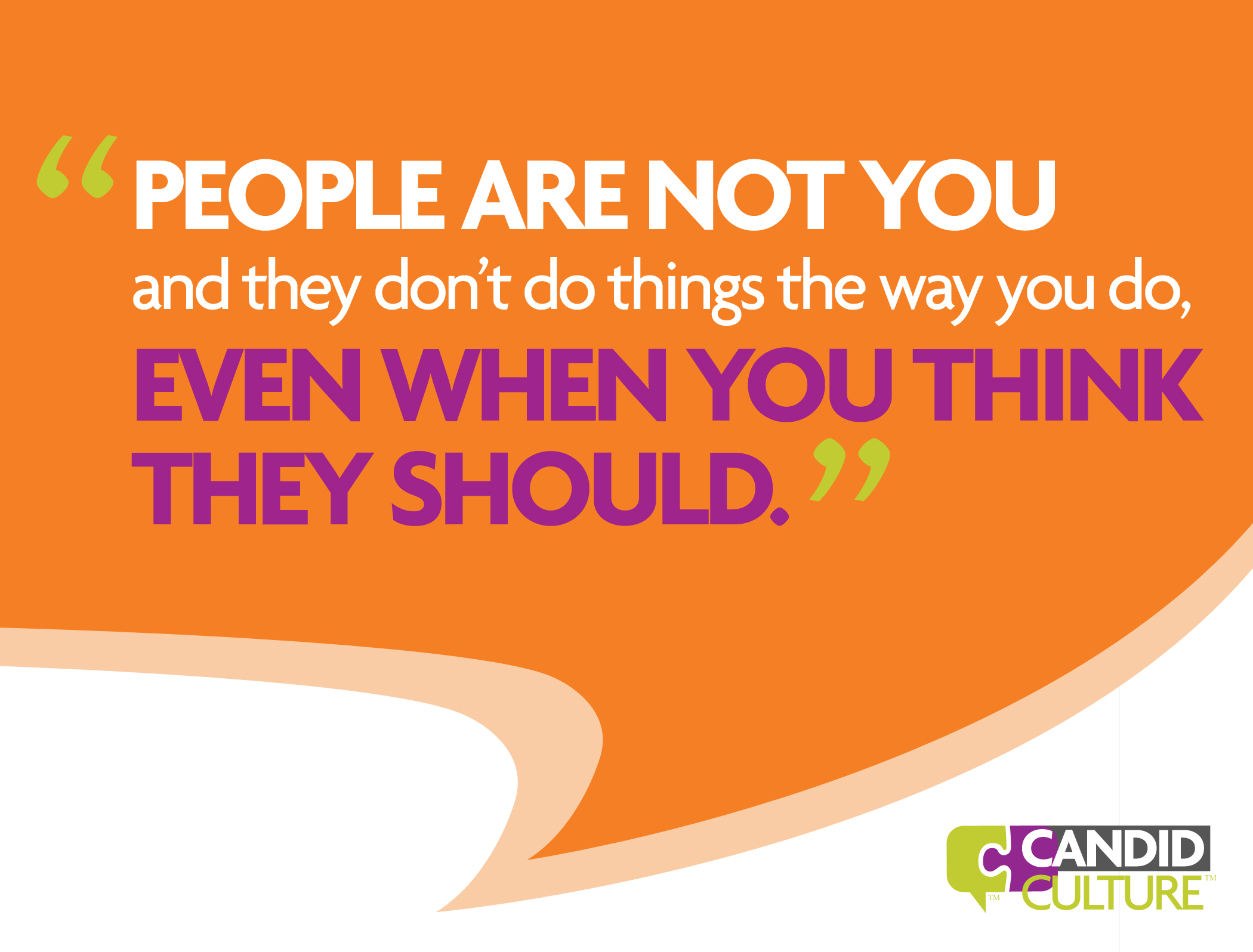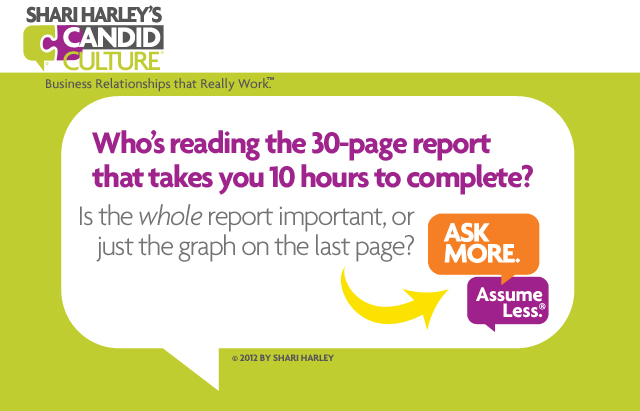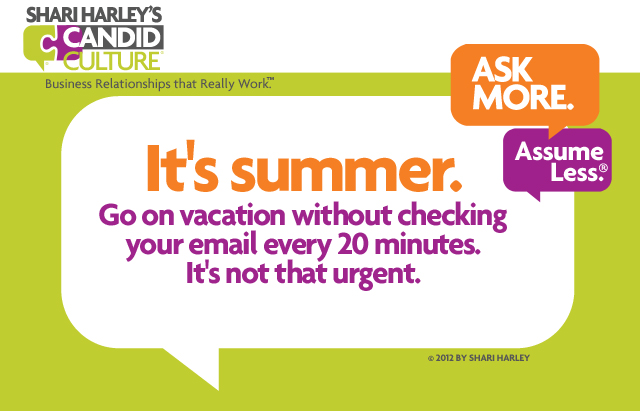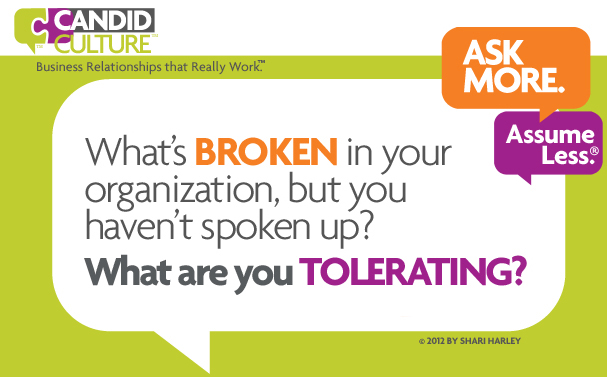Posts Tagged ‘communication’
I received lots of emails last week about performance appraisals gone wrong. Some made me sad. Some made me sigh. And the ‘best of’ the worst was so outlandish it made me laugh out loud. Really laugh out loud. Not that LOL thing we overuse.
The ‘best of’ the worst examples of performance appraisals are below.
Bad example #1: Giving mixed messages.
• Giving an employee working on a long project gift cards as a reward and then during the performance appraisal telling her she did the whole project wrong and had to start over.
Bad example #2: Waiting too long to give feedback.
• Giving an employee a performance appraisal six months late.
Bad example #3: Being lazy.
• Using the employee’s self appraisal as the final appraisal, without the manager adding any of his or her own comments.
Bad example #4: Never awarding the highest rating possible, to anyone.
• If a one is the best rating and a five is the worst rating, no one ever earns a one.
Bad example #5: Holding people to expectations and standards but not sharing those expectations.
• Not clarifying at the beginning of the year what the expectations are and what a good job looks like.
Bad example #6: Never giving employees feedback about their performance.
• Writing performance appraisals and documenting performance issues, but giving none of the written or verbal feedback to the employee.
Bad example #7: Giving small amounts of vague feedback.
• Giving little to no data in the review because the manager didn’t work closely enough with the employee to observe performance directly and didn’t ask others in the organization to provide feedback.
Bad example #8 (I received this example SEVERAL times): Providing only a written appraisal.
• Handing an employee a written appraisal while in a meeting with other people and never having a conversation.
This is just hilarious:
“During my annual performance appraisal I was asked if I was manic. After a moment or two of trying to understand what my supervisor meant by the comment, I finally asked. My supervisor replied, “Well, you are so upbeat about your job all the time, I just thought you were manic. Nobody can be that happy about working here.””
The winner for being the ‘best of’ the worst:
My manager tossed my performance appraisal on my desk saying, “Just look this over and sign it. I want it back by the end of the day.” Of course, the appraisal was full of feedback and expectations that I had never received.
I told my manager, “There is a lot of information here that was never discussed with me. I would have liked the opportunity to discuss these issues before it showed up in my review.”
The manager replied, “See this is why I didn’t want to meet with you! I knew you would react badly! Just man up, take the feedback, and sign the thing! It’s due to HR today.”
You can’t make this stuff up.
Managers: If you do a little better than these ten examples of performance appraisals, you’re outperforming your manager peers. Sad but true.
Employees: You are responsible for your career happiness, success, and satisfaction, not your boss. Ask for expectations at the beginning of anything new and for regular feedback.
Take your performance into your own hands:
1. Don’t wait for your boss to set expectations. Ask your boss for his/her expectations. Get very clear on what a good job looks like, before you start working on a project and/or when the year starts.
2. Write annual goals and review them with your direct supervisor at least quarterly. During your regular one-on-ones, ask for feedback. If you don’t have regular one-on-ones, start. Ask your boss’s permission to schedule a one-on-one at least quarterly to update him/her on projects and to gather feedback.
3. Ask for regular feedback on pieces of work as you complete the work. Don’t wait until the end of a project to get feedback.
4. Ask for feedback about your overall performance once a quarter.
Ask these questions:
• How am I doing so far this year performance wise?
• What mistakes have I made from which I need to recover?
• What aspects of my work have contributed most to the organization?
• What do I need to do between now and the end of the year to ensure a positive performance appraisal?
The performance appraisal system doesn’t have to be rife with challenge and lead to disappointment. Take more control over your conversations and thus your outcomes.
No matter how much you like and get along with your boss, your boss is not your friend. Nor is your boss your confidant or venting buddy.
Unless your boss follows you around all day, every day, she is not aware of all the things you do at work. And if she does follow you around, she probably needs more to do, which I doubt.
Given that your boss often doesn’t see you work, the only exposure you may have to each other is during one-on-one and group meetings. So be careful how you behave during these meetings.
I’ve made lots of career mistakes . . . once. Here’s a mistake I made before launching Candid Culture. I’m hoping you won’t replicate it.
In my last job, I was lucky enough to have a great boss. He was a good coach and mentor. He supported me, gave me exposure throughout the company, and always had my back. We didn’t cross paths much at work, except during our regularly scheduled one-on-one meetings.
I’m what some might call passionate. I have a strong sense of what is right and what is wrong. And I can be critical of those who I think don’t do the right things.
I would often share my frustrations with my boss. The head of that department didn’t do this. This person made a bad call. So and so was making my employees’ lives hard. I wasn’t complaining, well I kind of was, but not without a purpose.
One day my boss called me out on my passionate (and at times critical) style. He said that if I was so impassioned during meetings with him, he assumed I was equally vocal in meetings with other people and departments.
This wasn’t the case. I was very careful in how I managed myself with other people in our company. I understood the importance of good business relationships and knew that people work with the people they want to work with and around the people they don’t.
But my boss didn’t get to see any of those interactions. For the most part all he saw was how I interacted with him during our meetings. With no other point of reference he was left to assume that if I vented with him, I did this with other people. If I got a little too soapboxish about an issue with him, I must do the same in other meetings. I didn’t do those things with other people, but he had no way to know that.
My boss and I had a good relationship and I felt comfortable with him, probably too comfortable. I was politically savvy with everyone but him.
Your boss is an appropriate person with whom to express frustration, but manage how you do it. Don’t vent to vent. Every topic you raise should be with the aim of problem solving. Keep things honest but positive. Vent and complain at home, or with someone who doesn’t know the people you work with. Or better yet, spare your friends and family, and take your frustration to the gym, or the shoe department, whatever your preferred form of therapy.
Assuming you have limited exposure to your boss, make the time you have with her count. Put in front of your boss only what you want her to see. I’m not saying to be disingenuous or brush problems under the rug. Speak candidly, but manage yourself with your boss as you would with any internal or external customer.
If you stayed out until two in the morning and you’re dragging the next day, your boss doesn’t need to know that. She will assume you’re not on your game that day and that will be a check mark in the negative category for lacking good judgment and commitment to your job and the company. If you had a bad date, your boss doesn’t need or even want to know. If you think someone you work with is a dolt, ask for help in how to work well with him, and keep your opinion of his acumen to yourself.
Your boss has limited time and exposure to you. Manage yourself by showing him your polished and professional self.
Unfortunately people taking phone calls via speaker phone, listening to music without headphones, and entertaining a posse’ of visitors in his/her cube is not limited to the movie Office Space, which should be required viewing for anyone who works with other people.
Cubeland can be loud. And most people are hesitant to ask our coworkers to quiet down. We’re afraid of the conflict. We don’t want our coworkers to dislike us, talk poorly about us when we’re not there, or kill us off. So we suffer in silence, hoping the person will get a clue that he’s making us crazy. He won’t. If he knew the phone calls bugged you, he would have already stopped making them.
You may find it incredulous that your coworkers don’t know how annoying noise in cubeland is. It’s an obvious, no brainer. How could they not know?

Much of Candid Culture’s work is dedicated to people feeling more comfortable telling the truth at work. But even with books, and training on how to establish candid relationships and tell the truth, speaking up is often challenging. So know that if you are doing annoying people at work, they are not likely to tell you.
Here’s what you can do: Avoid annoying people at work. For your convenience, I’ve made a short list.
- Conversations, music, and phone calls taken on speaker phone in cubicles. Take the meeting or conversation to an empty office or conference room.
- People who are late for meetings and text or email throughout meetings.
- People who start most sentences with, “No we can’t do that, and here’s why.”
- People who say they’ll do something and miss the deadline every time.
- People who borrow your stuff and don’t return it.
Look at how much stress I’ve saved you. Now you don’t need to give the people you work with feedback, you can just forward them this blog, which is a passive aggressive form of feedback. But it beats throwing their phone out the window or hiding out in an empty office so you can actually get some work done.
If you choose candor instead (which I, of course, prefer) simply say, “It’s hard to work when music is playing, or when you’re on your speaker phone, or you’ve got visitors in your cube. I know space is at a premium. But if you’d be willing to take the conversations elsewhere, I’d really appreciate it.” Done in twenty seconds or fewer. And no one died. You can do it. And if you can’t, call me, and I’ll do it. It’s always easier to have these conversations when they’re not your own. But it will cost you a bag of chocolate chip cookies or perhaps a Candor Bar.
The sprinkler guy just left my house, after teaching me the nuances of how sprinklers work for TWO hours. I don’t want the details about how the sprinklers function. I don’t care. I just want them to work. And I told the sprinkler guy this. But he insisted on teaching me –a.k.a. dragging me to each broken sprinkler head and having me observe as he repaired it. Exasperating! Then he billed me for his time. Without the lesson the visit would have been 30 minutes and $45. With the lesson, it was two hours and $130.
Read your audience. Are you putting in too much work?
Where are you over communicating? Who’s reading all of those PowerPoint presentations and reports? Just because you’ve created that report for the past five years doesn’t mean it’s still necessary or desired.
Ask your internal and external customers (everyone you work closely with) how they want to receive information, in what format, and how frequently.

Ask internal and external customers:
- Do they prefer to receive information in bullets or narrative form? Detailed or big picture? Graphs and/or charts?
- What information is important and what is unnecessary?
- Who needs to receive the information? People have enough to read. Most people won’t be insulted to receive one fewer email.
- How often do they want to receive the information?
I am hesitant to change processes when I begin working with an organization, assuming there is a good reason they exist. But when I ask why we do certain things as we do, invariably no one can tell me. I am often told, “We’ve just always done it that way.”
Don’t change things just to change them. And before you make a change, consult those who are impacted. Ask what people want and what they don’t. Then make changes. You may just pick up 10 extra hours each week and reduce your and others’ frustration 20 fold.
Most professionals spend their work day constantly checking email. An email comes in, and we feel compelled to reply. We put aside the project we were working on and promise ourselves we’ll get right back to it. But then we receive five more emails, and so most days go. As a result, many people start doing their actual jobs at 5:00 p.m.
When was the last time you did an hour and a half of actual work without being drawn into your inbox? My hunch is, not in years.
Email has become a noose and an albatross.
I too have fallen into the constantly checking email, time-sucking trap. Every email must be returned immediately. Or worse, I open emails, read them and say I will reply later, but never do. I promise myself I’ll go back to the old, unanswered messages only to get distracted by the many more emails that have piled on top of the existing emails. Older messages get buried, never to be returned. And I, in turn, become a seemingly unresponsive flake.
The days that I discipline myself to read my email only after working on a project for a good chunk of time, are the days I get the most done and feel the most in control of my day. We have all started our work day with a well-intentioned list of things to do, only to find that at the end of the day we did none of them. This lack of control feels terrible and is unbelievably stressful.
Most time management books and training programs recommend checking email at certain intervals during the day –once in the morning, once in the afternoon, and once at the end of the day. Read an email once and resolve it. Reply, delete, or forward the message to a more appropriate person. But this is hard to do. What happens if we don’t reply immediately? Will we look bad? What will we miss?
One of the keys to having a balanced life and true down time is to be disciplined about how you spend your working hours.
What if we made July, check-your-email-every-three-hours month? How much more would we get done? How much more relaxed and free would we feel?
I’m going to try it, and I’m expecting you to keep me true to my word. If you send me an email and I reply immediately, you’ll know I have failed and have been sucked into the Outlook vortex of lost time. But if you read my reply, I’ll know you’ve been sucked in too.

There are things in our lives that bug us, but we put up with them. They’re often little things like a burned out light bulb or a messy drawer in which we dump stuff that doesn’t have a real home. Maybe the bulb has been out or the drawer has been a mess for so long that we no longer even notice it.
Our workplace isn’t any different. There are things in your organization you’re tolerating. Perhaps a process or software is inefficient, but you don’t say anything to the people in your organization who can do something about it. Or maybe you said something a few times, but you didn’t feel anyone listened and you gave up.
Organizations are comprised of doers and leaders. And organizations need both. If everyone wants to lead, you’ll have trouble. If no one leads, you’ll have even more trouble. Doers keep things going from day-to-day. Leaders create opportunities, fix problems, and upgrade existing conditions.
I’m often asked to coach managers in organizations. The coachees’ boss tells me, “He’s a great employee. But if he wants to move up in this organization, he needs to be a leader.” And more often than not, the employee is confused by what the manager wants. Coachees say things like, “I give my opinion in meetings. I volunteer for stuff. What else does my boss want?”
I tell my coachees the most straightforward thing I know to transition from a doer to a leader –improve processes and look for opportunities to fix things that are broken.

Want to know how to become a leader in an organization? Ask these questions regularly:
- What in the organization frustrates people? What could we do differently to ease people’s frustration?
- Where do we have mediocre results? What’s the breakdown?
- Where are we wasting money? Where are our costs too high? Where are we losing revenue?
- What processes take longer than they need to? Or where is there a lack of process?
- Where do we have inefficiencies and redundancies?
- What practices work in one department that could work in another?
Leaders in organizations are always looking for ways to make things better. They look for opportunities and (picking their battles) pursue solutions. Pursuing a potential change does not mean asking your boss or department leader once or twice. It means telling someone in a position of formal authority about a missed opportunity, asking permission to make a change, and then doing the work required to make it happen. Leaders do not tell their boss about a problem and walk away. Leaders suggest and implement a solution.
I didn’t know that MeetUp groups were created as response to September 11th. I received this message by the Founder of Meet Ups and thought you might find it interesting.
Fellow Meetuppers,
I don’t write to our whole community often, but this week is special because it’s the 10th anniversary of 9/11 and many people don’t know that Meetup is a 9/11 baby.
Let me tell you the Meetup story. I was living a couple miles from the Twin Towers, and I was the kind of person who thought local community doesn’t matter much if we’ve got the internet and tv. The only time I thought about my neighbors was when I hoped they wouldn’t bother me.
When the towers fell, I found myself talking to more neighbors in the days after 9/11 than ever before. People said hello to neighbors (next-door and across the city) who they’d normally ignore. People were looking after each other, helping each other, and meeting up with each other. You know, being neighborly.
A lot of people were thinking that maybe 9/11 could bring people together in a lasting way. So the idea for Meetup was born: Could we use the internet to get off the internet — and grow local communities?
We didn’t know if it would work. Most people thought it was a crazy idea — especially because terrorism is designed to make people distrust one another.
A small team came together, and we launched Meetup 9 months after 9/11.
Today, almost 10 years and 10 million Meetuppers later, it’s working. Every day, thousands of Meetups happen. Moms Meetups, Small Business Meetups, Fitness Meetups… a wild variety of 100,000 Meetup Groups with not much in common — except one thing.
Every Meetup starts with people simply saying hello to neighbors. And what often happens next is still amazing to me.
They grow businesses and bands together, they teach and motivate each other, they babysit each other’s kids and find other ways to work together. They have fun and find solace together. They make friends and form powerful community. It’s powerful stuff.
It’s a wonderful revolution in local community, and it’s thanks to everyone who shows up.
Meetups aren’t about 9/11, but they may not be happening if it weren’t for 9/11.
9/11 didn’t make us too scared to go outside or talk to strangers. 9/11 didn’t rip us apart. No, we’re building new community together!!!!
The towers fell, but we rise up. And we’re just getting started with these Meetups.
Scott Heiferman (on behalf of 80 people at Meetup HQ) Co-Founder & CEO, Meetup New York City September 2011






